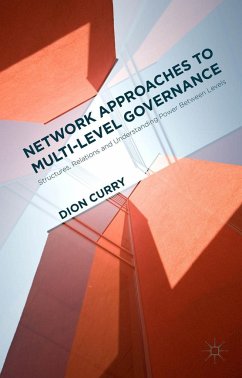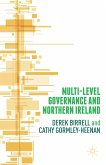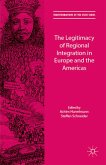This book explores how political structures and relations affect the 'black box of power' between governmental levels. It draws on case studies in Canada, the UK and continental Europe to illustrate how the design of political structures and the relative hierarchy of the relations between actors affect how governments deliver services.
Hinweis: Dieser Artikel kann nur an eine deutsche Lieferadresse ausgeliefert werden.
Hinweis: Dieser Artikel kann nur an eine deutsche Lieferadresse ausgeliefert werden.
'Like Deil Wright's classic 1978 Understanding Intergovernmental Relations, Dion Curry's Network Approaches to Multi-Level Governance makes a significant contribution to understanding the shift from Intergovernmental Relations to Multi-Level Governance. He does so by drawing on a rich range of comparative settings and experiences. It is a book which like Wright's will stand the test of time. It is nuanced, insightful and a must for any MLG library.'
Patrick J. Smith, Director, Institute of Governance Studies/Professor of Political Science, Simon Fraser University, Vancouver, British Columbia, Canada
'Although the concept of multi-level governance has emerged as a central feature of the social and political sciences in recent years, few studies have examined how politics shapes governance with the precision offered by Dion Curry. The fact that this is achieved while making the concept travel beyond the European Union is a remarkable achievement.'
Matthew Flinders, Professor of Politics/Director of the Crick Centre for the Public Understanding of Politics, University of Sheffield , UK
'It can be frustrating to see a literature on comparative politics dominated by a focus on formal institutions. In policy studies, the aim is to focus on more fluid processes. Curry's focus on multi-level governance, when comparing Scottish and British Columbian policymaking, is therefore a welcome addition to policy scholarship. Further, Curry subjects MLGto critical analysis to make sure that this focus on a messy policy process does not come at the expense of conceptual clarity.'
Paul Cairney, Professor of Politics and Public Policy, University of Stirling, UK
Patrick J. Smith, Director, Institute of Governance Studies/Professor of Political Science, Simon Fraser University, Vancouver, British Columbia, Canada
'Although the concept of multi-level governance has emerged as a central feature of the social and political sciences in recent years, few studies have examined how politics shapes governance with the precision offered by Dion Curry. The fact that this is achieved while making the concept travel beyond the European Union is a remarkable achievement.'
Matthew Flinders, Professor of Politics/Director of the Crick Centre for the Public Understanding of Politics, University of Sheffield , UK
'It can be frustrating to see a literature on comparative politics dominated by a focus on formal institutions. In policy studies, the aim is to focus on more fluid processes. Curry's focus on multi-level governance, when comparing Scottish and British Columbian policymaking, is therefore a welcome addition to policy scholarship. Further, Curry subjects MLGto critical analysis to make sure that this focus on a messy policy process does not come at the expense of conceptual clarity.'
Paul Cairney, Professor of Politics and Public Policy, University of Stirling, UK








